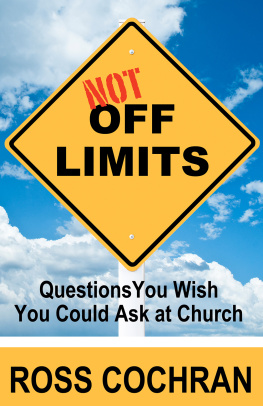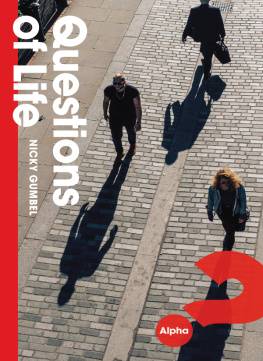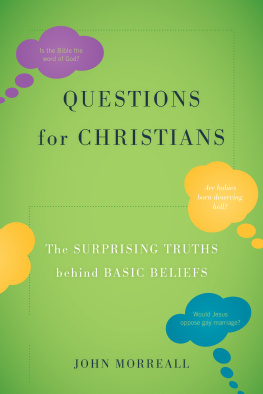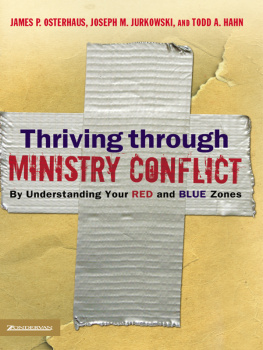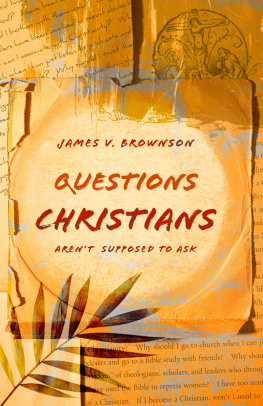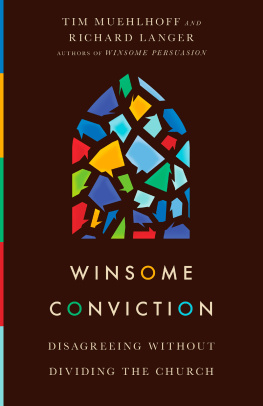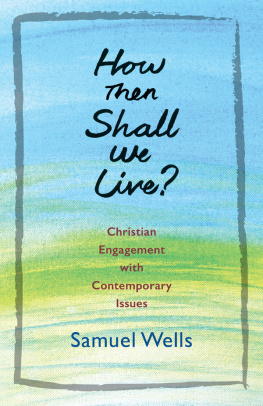I imagine writing a book alone would be like racing the Indianopolis 500 without a pit crew. Bad idea. The pit crew in this project consists of people who are not only extremely talented, they are also the kind of people Id love to have as neighbors. I feel fortunate that they were willing to help shepherd my first book from a rough idea to the essays you hold in your hands.
First, I want to thank Leonard Allen and the staff of Leafwood Publishers for making this happen. I doubt this book would have been written without the early enthusiasm Leonard expressed for the idea.
I am humbled by and grateful for the support provided by Michael and Jan Seay, John and Anita Henderson, Leon and Margaret Blue, and the elders of the Windsong Church of Christ in Little Rock, Arkansas. I am always amazed and inspired to see people act in ways that well deserve the tag generous.
I owe immense thanks to Jon Singleton for his editing expertise and his enthusiasm for the books goals. His observations, ideas, and suggestions made this book much better than if the words had been mine alone. Working with Jon reminded me of the multiple benefits of collaboration, and I deepened a friendship in the process.
Prior to completing the final draft, several persons proofread portions of the manuscript and provided constructive suggestions or caught typographical errors. Its unlikely that readers will be able to detect their specific contributions, but I know. These partners include Alyse Ross, Holly Goslin, Alyssa Abraham, Jim Hoffman, Sara Barton, and my colleagues in the College of Bible and Ministry at Harding University.
I deeply appreciate the following people who generously provided endorsements of the book: Mike Cope, director of the Pepperdine Bible Lectures; Monte Cox, dean of the College of Bible and Ministry, Harding University; Randy Harris, professor, spiritual director, and sponsor of the Monk Warriors; and David Wray, professor emeritus in the College of Biblical Studies, Abilene Christian University.
And finally, I want to thank my wife, Nita, who urged me to do this and who throughout our thirty-three years together has taught me to ask better questions.
Jeff is waiting by my office door as I return from my 11:00 AM class. Are you ready? I ask. After I put my books on my desk and grab my coat, we head down the stairs, out of the Bible building, and across the parking lot to my truck. We are off to one of the numerous Mexican restaurants near the campus where I teach. I have found conversations to be more casual at restaurants than in my faculty office, and I welcome that. I desire to foster relationships with students that are less formal than the relationships one might expect to exist between a fifty-five-year-old faculty member and a twenty-year-old student. University students desire mentors, and middle-aged teachers want to make a difference in the lives of younger people. Its a win-win.
Yesterday, Jeff asked a question in class that I sensed went beyond casual interest, and because it was important to him, it became important to me. Through the years I have found that engaging students questions as if they were my own makes not only for better conversation, but also for better-informed faith. Jeffs question is like so many other questions I hear from college-aged young adults in my context: questions of ultimate meaning and truth, of doctrine and theology, questions that demonstrate a desire to serve and keep faith, questions that demand attentive exploration. I feel privileged to be entrusted with them.
These musings on faith, shared between myself and searching students, almost always inspire and challenge me, because the questions come from that deep place where our souls store our yearnings. We are fellow seekers, chatting over lunch, exploring questions of ultimate importance. For spiritual stimulation its a combination hard to beat.
This book has grown out of the questions posed by students in my New Testament Church course at Harding University. For many years, I have invited them to submit any questions they would like for us to address during the course. I ask them to do this anonymously, hoping to free them to ask about any topic that interests them. I collect and compile the students questions into a single document that I entitle Our Questions. I then photocopy and return the questions to the class members at the next meeting. I do not purge the list in any way, nor do I alter the wording of their questions. Many Fridays I begin class by saying something like, Get out your copy of Our Questions. Lets look at #16 and #25. These two questions seem to be raising similar concerns. Lets talk about them. Then I begin the dialogue: (1) What do you think the person asking this question is concerned about? (2) Why is this question important? and (3) Where in Scripture would we go to begin to address this question?
I find it a good first move to invite students to turn to their neighbor and peer-dialogue about the question. This gives everyone a chance to voice their view (tentative as it may be) and to hear anothers view. Then I open the floor to anyone who wishes to contribute. After everyone has had a chance to be heard and to respond to others comments, I attempt to offer balanced and biblically faithful answers. In giving these answers, I aim to explore both the obvious and the less-than-obvious biblical texts that could shape our perspectives on the question. Though some of these dialogues take only fifteen minutes, if the question is important enough and the students are highly interested, I sometimes let these discussions consume the entire class period. I believe that students learn more from these open, searching conversations than they could from simply hearing me lecture to them. I get to say everything in these discussions that I would say in a lecture, but they listen more intently because they have first been heard and the questions are theirs.
I intend for my responses to be candid and conciliatory. To qualify as authentic dialogue, transparency and respect for opposing views must be present in generous amounts. Even in a university closely tied to a particular faith tradition (mine is affiliated with the Churches of Christ), the students bring numerous theological orientations into the classroom. In my experience, some students hold fairly traditional views, others are working from different traditions entirely, and still others are searching for creative re-readings of Scripture. Once in a while, I encounter students who seek unorthodoxy for its own sake. I have no doubt that there can be genuine good at the root of even this contrarian form of self-expression, as these students try to leave behind the faith of their elders in search of their own faith, or perhaps as they give voice to some unresolved personal issue from the past. It is not uncommon for all of these kinds of students to seek follow-up conversations with me, just like the one I am having over lunch with Jeff.
I invite you to eavesdrop on these theological conversations as you read the chapters of this book, to form your own opinions, and to discuss them with fellow Christians whose minds and hearts you have come to trust.
We Christians are on a journey together. We seek progress in holiness and ministry, living and thinking. But we seek this progress together. This makes the journey itself nearly as significant as the destination. May we walk together as friends, not enemies, as partners, not opponents, and may the resulting unity give our God pleasure.
Q uestions stretch us. They prompt us to think. (Just ask Socrates, who believed question posing to be the best way to educate). Given the complexity of the questions now facing us, the church needs to think carefully about them. But not just any kind of thinking will suffice. We need the kind of inquiry that helps us face our problems

